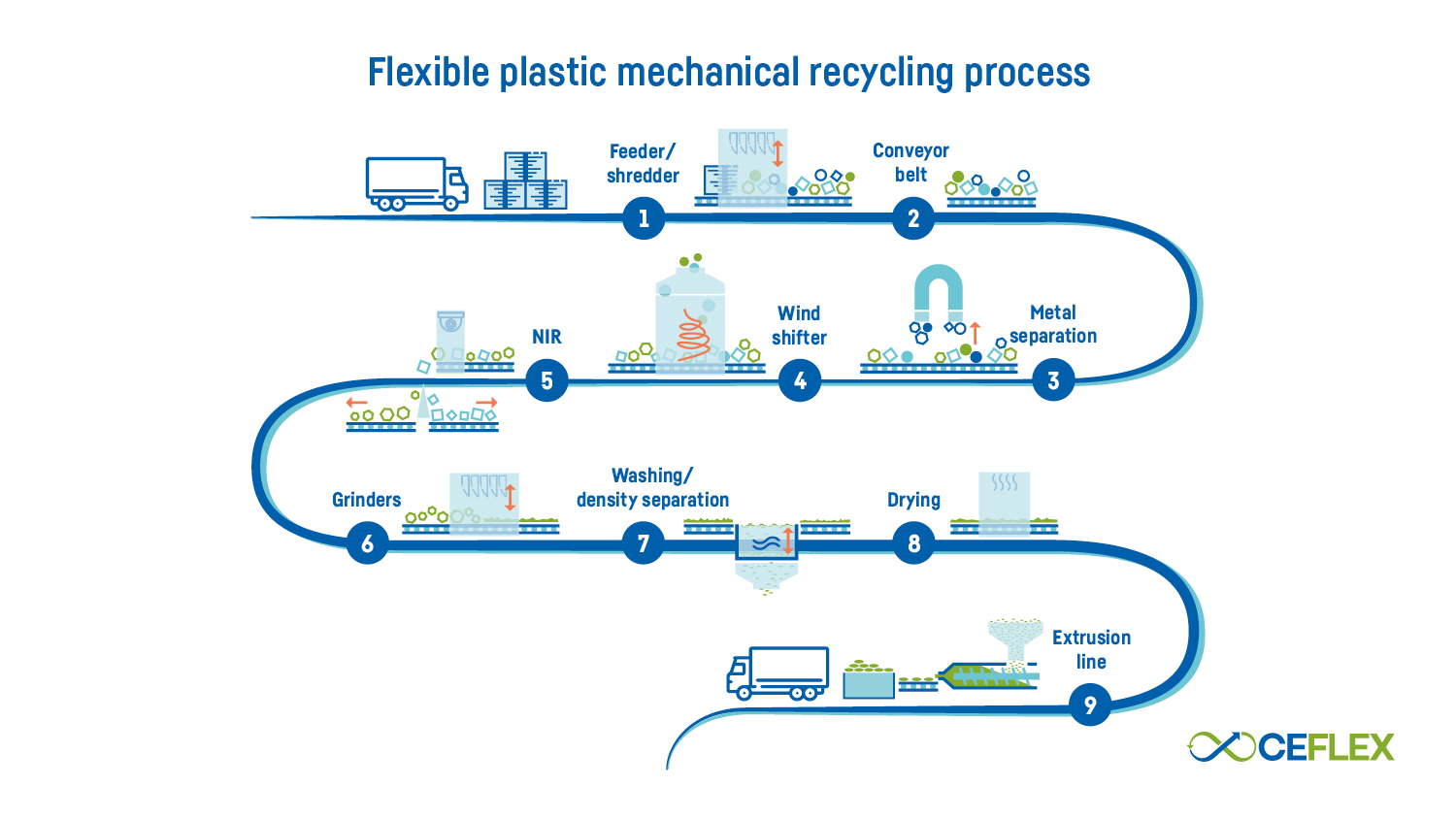Flexible packaging is recyclable and recycled using mechanical infrastructure used commonly and at scale around the world. Better design and infrastructure are providing a blueprint for new circular businesses, supporting entrepreneurs and helping local communities earn new income.
Optimised packaging design such as CEFLEX’s ‘Designing for a Circular Economy’ guidelines is fundamental to the sustainable business case for these initiatives and their adoption of the circular economy. Discover initiatives in Ghana, India and Indonesia leading the transformation.
One such example is the ASASE Foundation ‘Closing the Loop’ project in Accra, Ghana, where over 350 jobs both formal and informal are currently supported in two communities. The model is simple and effective. Plastic waste is separately collected by the informal sector and sold to the recycling facility, crushed, washed and pelletized to be sold for reuse in products such as various film structures, household items or building materials. Not only are waste management issues alleviated in Accra, but the unlocked value of plastic waste is channelled back to these communities in the form of jobs and new income streams.
 Since its start in January 2021, the Closing the Loop diverted around 2’700 tons of plastic waste from various streams, including from their collection centres, schools where they run educational programmes on plastic waste sorting, as well as monthly clean-ups conducted along Accra’s coastline. Replication of this model in 2 new communities of Accra by the end of 2023 is in progress.
Since its start in January 2021, the Closing the Loop diverted around 2’700 tons of plastic waste from various streams, including from their collection centres, schools where they run educational programmes on plastic waste sorting, as well as monthly clean-ups conducted along Accra’s coastline. Replication of this model in 2 new communities of Accra by the end of 2023 is in progress.
A waste aggregator collaborating with the ASASE Foundation, collects typically up to 10 tons of waste every month and uses the income generated to support their family.
Many countries around the world are discovering the powerful combination of the circular economy for flexible packaging. Ensuring these materials are well designed and able to be used again is an economic and environmental opportunity – reducing waste and creating sustainable business opportunities for companies and communities.

In Khopoli, Maharashtra, India, a site developed as part of the Huhtamaki Foundation’s #CloseTheLoop initiative recycles about 1,600 kilograms of post-consumer used flexible plastic waste per day; tackling post-consumer waste to deliver a valuable secondary resource material.
 It processes post-consumer waste to create resin to produce refined compounds to be used for household products for consumers in India. Recycled material from well-designed flexible packaging helps ensure these high-quality end markets are possible.
It processes post-consumer waste to create resin to produce refined compounds to be used for household products for consumers in India. Recycled material from well-designed flexible packaging helps ensure these high-quality end markets are possible.
The Central Pollution Board of India (2012) estimates that India generates close to 26,000 tonnes of plastic waste a day and a little over 10,000 tonnes a day of plastic waste remains uncollected. A more circular approach, bridging the gap in recycling and reuse of waste material in new products could help increase GDP by 5-10% according to Mahindra & Mahindra.
Project STOP works hand-in-hand with regional governments to create effective circular waste management systems in high-need areas in Indonesia. The initiative supports cities through a system-enabler approach by providing waste management infrastructure, technical expertise and behavioural change campaigns. Providing a holistic system is reducing the harmful impact of mismanaged waste on public health, tourism, and fisheries. Rather than building traditional linear systems, where waste is collected and simply disposed at landfill, Project STOP also aims to create circular systems, where waste – including flexible packaging – is recycled into new products and the resulting economic value lowers the financial burden of the waste system on the city. Project STOP is solving the root causes of marine littering and is increasing the efficient use of resources, while opening social and economic benefits for communities.

By September 2022 Project STOP has served a population of 278,000, most of them with access to a formal waste management system for the first time. It has created 318 new full-time jobs and has collected 35,000t of waste, of which 4,000t are plastics. This supports Indonesia’s national government commitments to reduce plastic pollution and boosts sustainable financing models through governmental and private sector systems, helping to cultivate a coordinated governance model with clear responsibilities and accountabilities, further contributing to the waste system’s effectiveness and efficiency.
